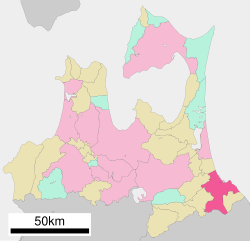Hachinohe, Aomori
|
Hachinohe 八戸市 |
|||
|---|---|---|---|
| Special city | |||

Hachinohe City Hall
|
|||
|
|||
 Location of Hachinohe in Aomori Prefecture |
|||
| Coordinates: 40°30′44.2″N 141°29′18.2″E / 40.512278°N 141.488389°ECoordinates: 40°30′44.2″N 141°29′18.2″E / 40.512278°N 141.488389°E | |||
| Country | Japan | ||
| Region | Tōhoku | ||
| Prefecture | Aomori Prefecture | ||
| Government | |||
| • - Mayor | Makoto Kobayashi | ||
| Area | |||
| • Total | 305.54 km2 (117.97 sq mi) | ||
| Population (September 1, 2015) | |||
| • Total | 231,337 | ||
| • Density | 757/km2 (1,960/sq mi) | ||
| Time zone | Japan Standard Time (UTC+9) | ||
| City symbols | |||
| - Tree | Japanese yew | ||
| - Flower | Chrysanthemum | ||
| - Bird | Black-tailed gull | ||
| Phone number | 0178-43-2111 | ||
| Address | 1-1-1 Uchimaru, Hachinohe-shi, Aomori-ken 031-8686 | ||
| Website | www |
||
Hachinohe (八戸市 Hachinohe-shi?) is a city in southeastern Aomori Prefecture in the Tōhoku region of Japan.
As of September 2015, the city had an estimated population of 231,337 and a population density of 757 persons per km2 (1,997 persons per sq. mi.). This makes it the second biggest city of Aomori prefecture. The total area was 305.43 square kilometres (117.93 sq mi).
The area around Hachinohe has been occupied since prehistoric times, and was a major population center for the Emishi people. Numerous Jomon period remains have been discovered within the borders of Hachinohe. The area was nominally under control of the Northern Fujiwara in the Heian period, and became part of the holdings granted to the Nanbu clan after the defeat of the North Fujiwara by Minamoto Yoritomo in the Kamakura period. The Nanbu established numerous horse ranches, accompanied by numbered fortified settlements. During the Edo period, it was initially part of Morioka Domain, but in 1664 the Tokugawa Shogunate authorized the creation of a separate 20,000 koku Hachinohe Domain for a branch line of the Nanbu clan. The town prospered as a castle town centered on Hachinohe Castle, and served as a small commercial centre and port for the fishing grounds off southeastern Hokkaido. Today, the port still serves the fishing industry and a number of international cargo vessels.
...
Wikipedia



